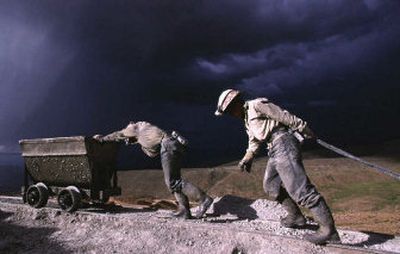Vein of discontent

TORONTO — Bolivia’s plan to nationalize its natural gas industry and exert greater state control over all of its natural resources has North American mining companies fretting over their future prospects extracting the nation’s rich resources of gold, silver and tin.
The chairman of one of the world’s largest gold producers told his shareholders he would now “put my buck” on exploration in Pakistan, rather than the South American countries throwing up more roadblocks to foreign investors.
Patricia Dillon, president of the Prospectors and Developers Association of Canada, said plans by Bolivia to raise taxes and royalties on foreign mining firms are disconcerting.
“We respect the right of foreign governments to act as they see fit and in their people’s best interests. However, we believe that countries should be wary of adopting policies that, over the long term, will act as deterrents to foreign investment.”
Bolivia’s government said earlier this month that it would extend control over mining, forestry and other sectors of the economy, after President Evo Morales nationalized the country’s natural gas industry on May 1.
The moves solidify Morales’ role alongside Venezuela’s Hugo Chavez and Cuba’s Fidel Castro as Latin America’s new socialist-inclined leaders united against what they view as the capitalist influence of U.S. and other foreign investors.
Morales said his countrymen are weary of foreign exploitation of their natural resources and he intends to put more revenue from those assets back into the poorest country in South America.
“We’re not expelling any company, but they will not earn much — not like before,” Morales told Venezuela’s Telesur. “We hope they’ll remain partners and if they don’t respect these laws, we’ll make them respect them with political force.”
Vice President Alvaro Garcia Linera has emphasized that mining would not be nationalized. But he said foreign companies would face higher taxes and royalty payments and that the government would intensify enforcement of existing laws to break up big underdeveloped land holdings, apparently to turn them over to the poor.
Scott Lamb, vice president of investor relations for Coeur d’Alene-based Coeur d’Alene Mines Corp., the world’s largest publicly traded silver producer, said the events in Bolivia would not deter the company’s San Bartolome mining project there, having invested $35 million in a project that hopes to produce 8 million ounces of silver a year.
“We’re certainly mindful of the political situation in Bolivia, but the mining industry in that country has a history that goes back hundreds of years and the understanding and respect of the mining industry is ingrained in the culture,” Lamb said.
But the uncertainty prompted the founder of Barrick Gold Corp., one of the world’s largest gold producers, to say he now sees Pakistan as a better place to invest in, despite the presence of Islamic militants in the South Asian nation.
Speaking at a mining conference in Peru last week, Pierre Lassonde, president of Denver-based Newmont Mining Corp. and chairman of the World Gold Council, also expressed concerns about Bolivia.
“Looking at what’s happening in Bolivia, Ecuador and in Venezuela, I think one has to be nervous. This is every foreign investor’s nightmare, that you invest billions of dollars and all of a sudden you find that your investment has been nationalized,” he told reporters in Lima.
One senior official at a Canadian mining company, who did not want to be named, said the moves by Morales, compounded by what he called the endless harassment by environmentalists and bribe demands by Latin American officials, make Bolivia an increasingly unpleasant prospect.
However, Paul Zdebiak, vice president of the Canadian gold exploration firm Eaglecrest Explorations Ltd., sees the recent moves by Morales as political grandstanding that will cool down. His Vancouver-based firm has invested $25 million in the last 14 years in gold exploration in northeastern Bolivia and it intends to start drilling soon.
“He’s beating his chest and saying he’s going to be Robin Hood, robbing from the rich to give to the poor,” Zdebiak said. “But after a while, he just cannot isolate Bolivia from the international world when it comes to investing, because Bolivia is the poorest country in (South) America.”
Morales was elected in January with a mandate to help the working people, who often resent the multinational companies that have invested $3.5 billion in the landlocked nation.